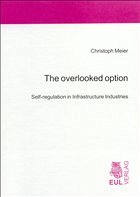As governments continue to privatize infrastructure services like electricity or gas the importance of private infrastructure providers increases. After some years these providers are often confronted with stricter state regulation that impacts their freedom of action and reduces their profitability. Providers often experience such stricter regulation as an unexpected risk that could not have been prevented. This book casts a different light on state regulation. In a first step, it shows that stricter state regulation is no unexpected force, but often a political feedback that reacts to actions of providers. This insight enables providers to develop strategies to deal with political feedback. In a second step, this book presents self-regulation as a tool to manage regulatory risks. In six case studies spanning the institutional history of several infrastructure industries like power, telephone and railroads in the US and Germany it analyses self-regulation in depth. The insights distilled from these case studies enable current infrastructure providers to better understand the opportunities and pitfalls of self-regulation and help them to develop their own regulatory strategy.
